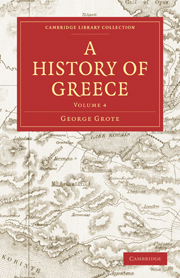Book contents
- Frontmatter
- Contents
- PART II CONTINUATION OF HISTORICAL GREECE
- CHAPTER XXV Illyrians, Macedonians, Pæonians
- CHAPTER XXVI Thracians and Greek Colonies in Thrace
- CHAPTER XXVII Kyrênê.—Barka.—Hesperides
- CHAPTER XXVIII Pan-Hellenic Festivals—Olympic, Pythian, Nemean and Isthmian
- CHAPTER XXIX Lyric Poetry.—The Seven Wise Men
- CHAPTER XXX Grecian Affairs during the Government of Peisistratus and his Sons at Athens
- CHAPTER XXXI Grecian Affairs after the Expulsion of the Peisistratids.—Revolution of Kleisthenês and Establishment of Democracy at Athens
- CHAPTER XXXII Rise of the Persian empire.—Cyrus
- CHAPTER XXXIII Growth of the Persian Empire
- CHAPTER XXXIV Dêmokêdês.—Darius invades Scythia
- CHAPTER XXXV Ionic Revolt
- CHAPTER XXXVI From Ionic Revolt to Battle of Marathon
- CHAPTER XXXVII Ionic Philosophers.—Pythagoras.—Kroton and Sybaris
- Titles in the Series
CHAPTER XXXVII - Ionic Philosophers.—Pythagoras.—Kroton and Sybaris
Published online by Cambridge University Press: 29 August 2010
- Frontmatter
- Contents
- PART II CONTINUATION OF HISTORICAL GREECE
- CHAPTER XXV Illyrians, Macedonians, Pæonians
- CHAPTER XXVI Thracians and Greek Colonies in Thrace
- CHAPTER XXVII Kyrênê.—Barka.—Hesperides
- CHAPTER XXVIII Pan-Hellenic Festivals—Olympic, Pythian, Nemean and Isthmian
- CHAPTER XXIX Lyric Poetry.—The Seven Wise Men
- CHAPTER XXX Grecian Affairs during the Government of Peisistratus and his Sons at Athens
- CHAPTER XXXI Grecian Affairs after the Expulsion of the Peisistratids.—Revolution of Kleisthenês and Establishment of Democracy at Athens
- CHAPTER XXXII Rise of the Persian empire.—Cyrus
- CHAPTER XXXIII Growth of the Persian Empire
- CHAPTER XXXIV Dêmokêdês.—Darius invades Scythia
- CHAPTER XXXV Ionic Revolt
- CHAPTER XXXVI From Ionic Revolt to Battle of Marathon
- CHAPTER XXXVII Ionic Philosophers.—Pythagoras.—Kroton and Sybaris
- Titles in the Series
Summary
The history of the powerful Grecian cities in Italy and Sicily, between the accession of Peisistratus and the battle of Marathon, is for the most part unknown to us. Phalaris, despot of Agrigentum in Sicily, made for himself an unenviable name during this obscure interval: his reign seems to coincide in time with the earlier part of the rule of Peisistratus (about 560—540 b.c.), and the few and vague statements, which we find respecting it, merely show us that it was a period of extortion and cruelty, even beyond the ordinary licence of Grecian despots. The reality of the hollow bull of brass, which Phalaris was accustomed to heat in order to shut up his victims in it and burn them, appears to be better authenticated than the nature of the story would lead us to presume: for it is not only noticed by Pindar, but even the actual instrument of this torture—the brazen bull itself—which had been taken away from Agrigentum as a trophy by the Carthaginians when they captured the town, was restored by the Romans, on the subjugation of Carthage, to its original domicile. Phalaris is said to have acquired the supreme command by undertaking the task of building a great temple to Zeus Polieus on the citadel rock; a pretence, whereby he was enabled to assemble and arm a number of workmen and devoted partisans, whom he employed, at the festival of the Thesmophoria, to put down the authorities.
- Type
- Chapter
- Information
- A History of Greece , pp. 509 - 562Publisher: Cambridge University PressPrint publication year: 2010First published in: 1847



